Warwick Campus Library Services
by Lisa Richter, associate director of public services
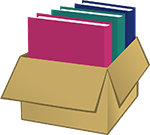
McKillop Library is pleased to provide targeted circulation and reference services to students at the Warwick campus! This fall, the majority of classes in Warwick are scheduled on Monday evenings. A librarian from McKillop Library delivers books requested by students, provides reference and research help for a two-hour block prior to the start of evening classes, and is available for scheduled information literacy workshops at the request of faculty. For more information contact Lisa Richter, associate director of public services at ext. 2284 or
lisa.richter@salve.edu.
Research Assistance & Consultation
by Lisa Richter, associate director of public services
McKillop Library is using a new appointment booking system to make scheduling research consultations easier for students and faculty. A link to the landing page for all reference librarians who use the booking tool can be found here:
https://salve.libcal.com/appointments.
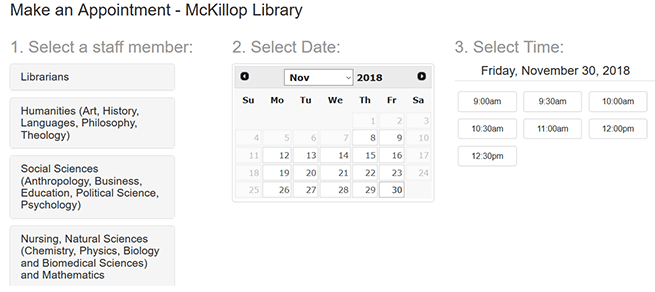
Notice that this page gives you more information about each librarian and the specific subject disciplines in which they specialize. Faculty are encouraged to add this link to their course syllabi and encourage your students to reach out for research help.
Crisis Mapathon 2018
by Nicole Marino, digital scholarship and instruction librarian
How often do you use turn-by-turn navigation applications such as Google Maps, Apple Maps, or Waze? We plug in an address – the house of a friend who has recently moved or that new restaurant a few towns over– and take for granted that our phones will not only recognize it but lead us there. Here in Newport, RI, we are on the map (on many maps, in fact!). But what if we weren’t?
Many areas of the world most affected by environmental disasters, outbreaks of disease, and violent conflict are under-mapped. In the course of crisis prevention and relief, humanitarian aid workers need access to detailed, accurate maps in order to plan risk reduction strategies and to seek out and navigate to people in distress. Hosting or participating in a mapathon is one way of addressing this critical information gap. A mapathon, much like a Wikipedia edit-a-thon, is a crowdsourcing event where volunteers gather and learn to edit portions of world maps that are sparsely detailed. Using
OpenStreetMap, remote volunteers trace and tag buildings, roads, waterways, and more in satellite images. These edits are then validated and elaborated by more experienced remote mappers and hyperlocal volunteers.
On Friday, November 2, McKillop Library hosted a Crisis Mapathon in conjunction with the Humanities and Technology Association (HTA) Conference. HTA Conference attendees, members of the Salve community, and members of our regional community learned to edit OpenStreetMap and made map edits to the Kerala region of India. This was a high priority project identified by the
Humanitarian OpenStreetMap Team (HOT), as Kerala is recovering from a summer monsoon season that caused the worst flooding it had seen in almost a century.
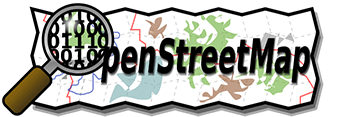
Following the workshop, Dr. Suzanne Levi-Sanchez, Assistant Professor of National Security Affairs at the U.S. Naval War College, contextualized the mapping activity by describing her fieldwork on the borderlands between Afghanistan and Tajikistan. Dr. Levi-Sanchez’s talk engaged participants with questions of what it takes to make a map during conflict and addressed issues such as relationships of mutual trust and respect with locals, moving satellites, and perhaps most importantly, the idea that making geographic information knowable and discoverable always has the potential to endanger people.
Mapathons empower participants to consider and strengthen their roles as global and digital citizens even when they may think they have no role to play in disaster relief and recovery. Mapathons demonstrate avenues through which technology can be leveraged during times of crisis, and they teach participants how to be responsible digital citizens working on a crowdsourcing project where each edit made is visible to the public almost immediately. Learning to edit OpenStreetMap, participants can also get a deeper sense of the politics of mapping processes – what it means to be mapped or left unmapped and how crucial it is to have a geographic dataset built and owned by the public.
Janet L. Robinson Curriculum Resource Center Updates
by Alicia Vaandering, education and instructional design librarian
We are excited to announce the opening of the CRC Learning Lab, a new instruction space in the northwest corner of the Curriculum Resource Center. Equipped with a teacher’s podium, computer, and flat-screen display, this new space can seat up to twenty-five students. The Learning Lab will cater predominantly to the needs of Salve’s Education Department, providing easy access to the diverse resources in the CRC. When the area is not reserved for instruction, it is open for individual and group study.
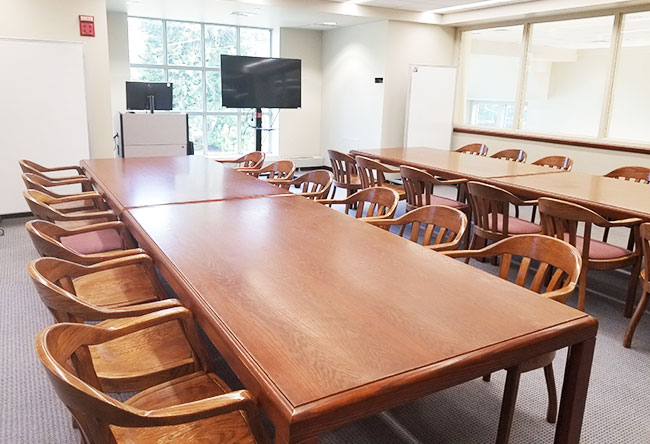
The CRC has also recently expanded its online presence, seeking to connect students, faculty, and other library users to our collections and services in new and innovative ways. The CRC Facebook page shares news and tips about recent acquisitions, trends in education theory and pedagogy, and exciting new tech tools. Our brand new Pinterest account highlights new additions to our collections as well as resources focused on specific themes at different grade and reading levels. You can follow us on
Facebook or
Pinterest @SalveCRC.
Databases and Collections
by Lisa Richter, associate director of public services
New Databases @ Your Library
The following databases are newly acquired for the 2018-2019 academic year:
ATLA Religion - Provides indexing and articles from religion and theology journals.
Statista - Includes a range of statistics and reports related to marketing and business. Provides consumer outlook surveys, industry reports, country reports, market studies, and company information.
University Reporter - Provides statistical information from the Survey of the American Consumer database, compiled from 25,000 consumer interviews each year, capturing extensive data on media use, product purchase, and attitudes and beliefs. Useful for business, marketing, and media research.
Note: The University Reporter database requires an individual account. For new users, please obtain the registration code from your professor or call the Info Desk at 401-341-2289 to obtain the registration code, which is available to Salve students, faculty, and staff only. Then register for an account using the registration code and your Salve email address. You will receive a confirmation email which you must respond to within 3 days to activate your account (you may need to check in your junk mail folder to find this email). Please note that your account will automatically expire every 6 months and you will need to re-register at that time. This database is limited to 10 simultaneous users.
Update: Kanopy Streaming Films

The library has moved to a mediated model of use with the
Kanopy database due to increasing costs. Immediate streaming will no longer be available for new films, as each film triggered in their system costs $120 per year to maintain. If a film is not available on DVD
in our catalog, nor through
Films on Demand or
World History in Video, faculty can request online access to individual films in Kanopy via email at
salvelibrarian@salve.edu or by completing the request form within Kanopy. Videos that have already been purchased will be available for immediate streaming until their licenses lapse (there are currently 89 films still available).
Library Displays
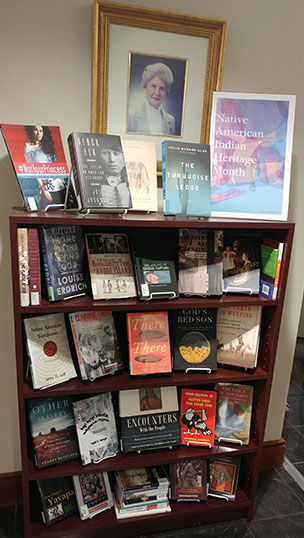 Diversity Display: Native American History Month
Diversity Display: Native American History Month
First Floor: West Wing
Display by: Genna Duplisea, archivist & special collections librarian
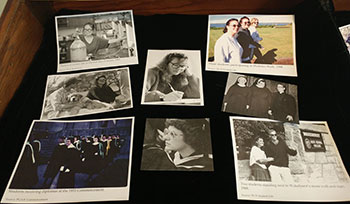 Spectacle Spectacle
Spectacle Spectacle
Display by: Genna Duplisea, archivist & special collections librarian and Brittany Fox ('18)
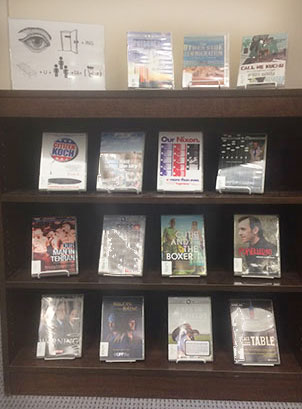 Eye Opening Documentaries
Eye Opening Documentaries [DVD]
First Floor: East Wing
Display by: Display by: Kiki Butler, special programs librarian
 New Releases
New Releases
First Floor: East Wing
Display by: Nancy Barta-Norton, acquisitions and cataloging librarian

